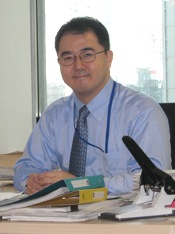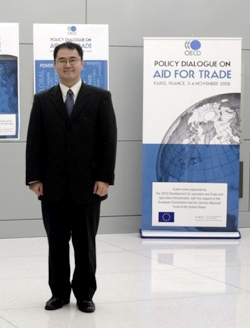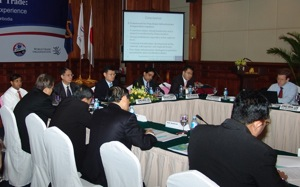 Masato Hayashikawa, Japan
Masato Hayashikawa, Japan
Policy Analyst, Organisation for Economic Co-operation and Development (OECD), Paris, France International Development Studies Program (’02/’03)
What is your area of specialization and how did you come to work in this area?
I work in the aid-for-trade unit of the poverty reduction and growth division within the OECD Development Co-operation Directorate, a.k.a. the DAC Secretariat. The unit is responsible for monitoring and assessing the flows and the impact of donors’ aid for trade to developing countries as part of the OECD’s contribution to the WTO-led Aid-for-Trade Initiative which was launched in the aftermath of the 2005 WTO Ministerial Conference in Hong Kong. I came to work in the area of aid for trade purely by chance. After graduating from GRIPS and working for a year in a development consulting firm, I joined the OECD in 2004 through the young professionals program. I was then assigned to work on this new project which was just taking off. I have been stuck with it ever since. : -) After Hong Kong, the WTO decided to set up a global monitoring process with the overall objective of improving the effectiveness and accountability of aid for trade. To this end, in close collaboration with the WTO, we developed a framework for monitoring aid for trade, mainly based on the aid flows data we collect annually from the member countries and international organisations. We recently completed the second monitoring survey, to which over 150 countries and international organizations participated, and put together the analysis and outcomes into the second edition of the joint OECD-WTO publication, Aid for Trade at a Glance: Maintaining Momentum. This joint report is the key OECD contribution to the initiative and was presented by the OECD Secretary-General Angel Gurria at a high-level WTO meeting on aid for trade, the Global Aid-for-Trade Review, in Geneva on 6 July 2009.
What led you to GRIPS? What was the most important thing you learned while here? And how has your experience at GRIPS prepared you for future endeavors?
Before coming to GRIPS, I lived and worked in the Philippines as an aid coordination specialist. I found out about the joint FASID/GRIPS program through Japan International Cooperation Agency where I was working at the time. I had been thinking about going back to school to study development issues in more depth. The IDS program was exactly what I was looking for – a one-year program, taught in English and based in Tokyo. I don’t think I studied more in my life than during that one year at GRIPS (even though this wasn’t my first Master’s degree…). Perseverance (injected with lots of coffee). : -) At GRIPS, not only did I gain a sound understanding of the fundamentals of the economic development theory, the program prepared me to think (and write) more analytically. These skills are very crucial for my job at the OECD, so I am thankful to all the training I received.
You are currently working as Policy Analyst at the OECD in Paris. What are some of the biggest challenges you face in your work and what has been the most rewarding aspect of your career thus far?
As part of my job, I have to interact and coordinate a lot with my colleagues in other parts of the organization, as well as with officials from member governments and other international  organizations. Even a one-page document can sometimes take weeks to draft because of a lengthy process of negotiations on the final text. Anything I draft gets scrutinized by not only my managers but also the member governments. Often times you don’t even recognize the end product because so many people have had their hands on it. There is also the issue of different working ethics (partially rooted to culture, I think). People don’t always work on your time schedule so you need to constantly remind them (politely : -)) about deadlines, etc. So, I think working in a place like the OECD helps me become better at people skills. But at the same time, because it is the OECD, our work often gets direct access to (and even influences) senior policymakers. The report I worked on was presented by the Secretary-General of the OECD and the Director-General of the WTO to Ministers and senior officials from the 153 WTO member countries. Now that’s very rewarding, makes the long hours and stress all worthwhile.
organizations. Even a one-page document can sometimes take weeks to draft because of a lengthy process of negotiations on the final text. Anything I draft gets scrutinized by not only my managers but also the member governments. Often times you don’t even recognize the end product because so many people have had their hands on it. There is also the issue of different working ethics (partially rooted to culture, I think). People don’t always work on your time schedule so you need to constantly remind them (politely : -)) about deadlines, etc. So, I think working in a place like the OECD helps me become better at people skills. But at the same time, because it is the OECD, our work often gets direct access to (and even influences) senior policymakers. The report I worked on was presented by the Secretary-General of the OECD and the Director-General of the WTO to Ministers and senior officials from the 153 WTO member countries. Now that’s very rewarding, makes the long hours and stress all worthwhile.
You have spent a lot of time outside Japan. Can you describe your experience of living, studying and working abroad? Where do you call ‘home’ these days?
I think I’m very lucky (as my wife always tells me). If my father had a different job and never travelled abroad I’m sure my life would have been very different from the one I have now. For me ‘living abroad’ is natural part of my life. Of course, there are ups and downs, but I do enjoy it very much. My experience has been a fulfilling one. After all it made me who I am today. : -) ‘Home’ is where my family is – so Paris is my home for now. But Japan will always be my true home. I want my children to also feel the same way as I do about Japan, a place where they can always go back, where their roots are. So we have two ‘homes’, just not in the same neighborhood. : -)
What do you miss about Japan and what do you like about living in Paris?
What I miss most about Japan is food – not that you can’t eat Japanese food in Paris but there aren’t that many good ones here and if they are they tend to be quite expensive… Another thing I miss is the convenience stores! What I like about living in Paris is the tree-lined boulevards, Haussmann architecture, the Seine, little parks, the weather (especially the dry, cool summer!), and the fact that the city is small enough that you can pretty much walk to anywhere.
If you could choose another profession to be in, what would it be?
I love what I do. But if I were to choose another profession, I think it will have to be in a completely different field, for example – though I know I don’t have the gift for it – in a creative profession, like a film director or an architect. I think living in the City of Arts has that affect on you.

What is your fondest memory of your time spent at GRIPS?
That would be eating lunch in the TV room of that old school building in Ichigaya. That’s where I ‘discovered’ the dal curry. A classmate of mine brought in home-made dal curry for lunch. It tasted so good that ever since that’s the only thing I order when I’m in an Indian restaurant.
What is your favorite thing to do when you are not working?
I have to say spending time with my two boys. They are just great fun.
How do you maintain a balance between your work and the rest of your life?
Family definitely plays a big part. One of the great things about working in a place like the OECD (which is a very European institution and is based in France, the nation of 35 working hours!) is that you have a lot of flexibility to balance your life at work and outside. The two never get mixed. People here, including the managers, respect your private life, especially time with your family. My supervisor, who is Dutch, leaves office everyday at 6:00 PM sharp so he can eat dinner with his children and put them to bed. Of course, given my position, I do not always have that luxury of going home early (when the work is at its peak) but even then compared to the typical Japanese working hour I think it is quite early. : -)
What advice would you give to current GRIPS students?
If you are interested in pursuing a career in an organization like the OECD I recommend working on your drafting and communication skills. Our work primarily involves drafting and presenting policy papers, so you really do need those skills. You have great teachers at GRIPS who can help, so take advantage of them. I speak for myself – right Paul-sensei? : -)





